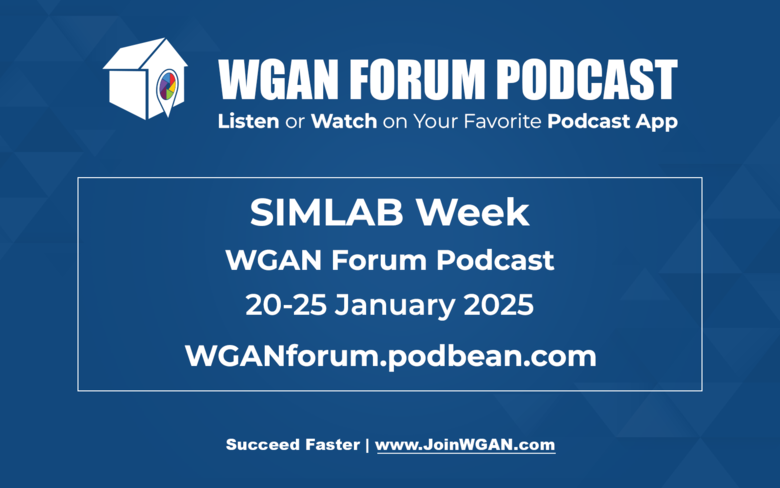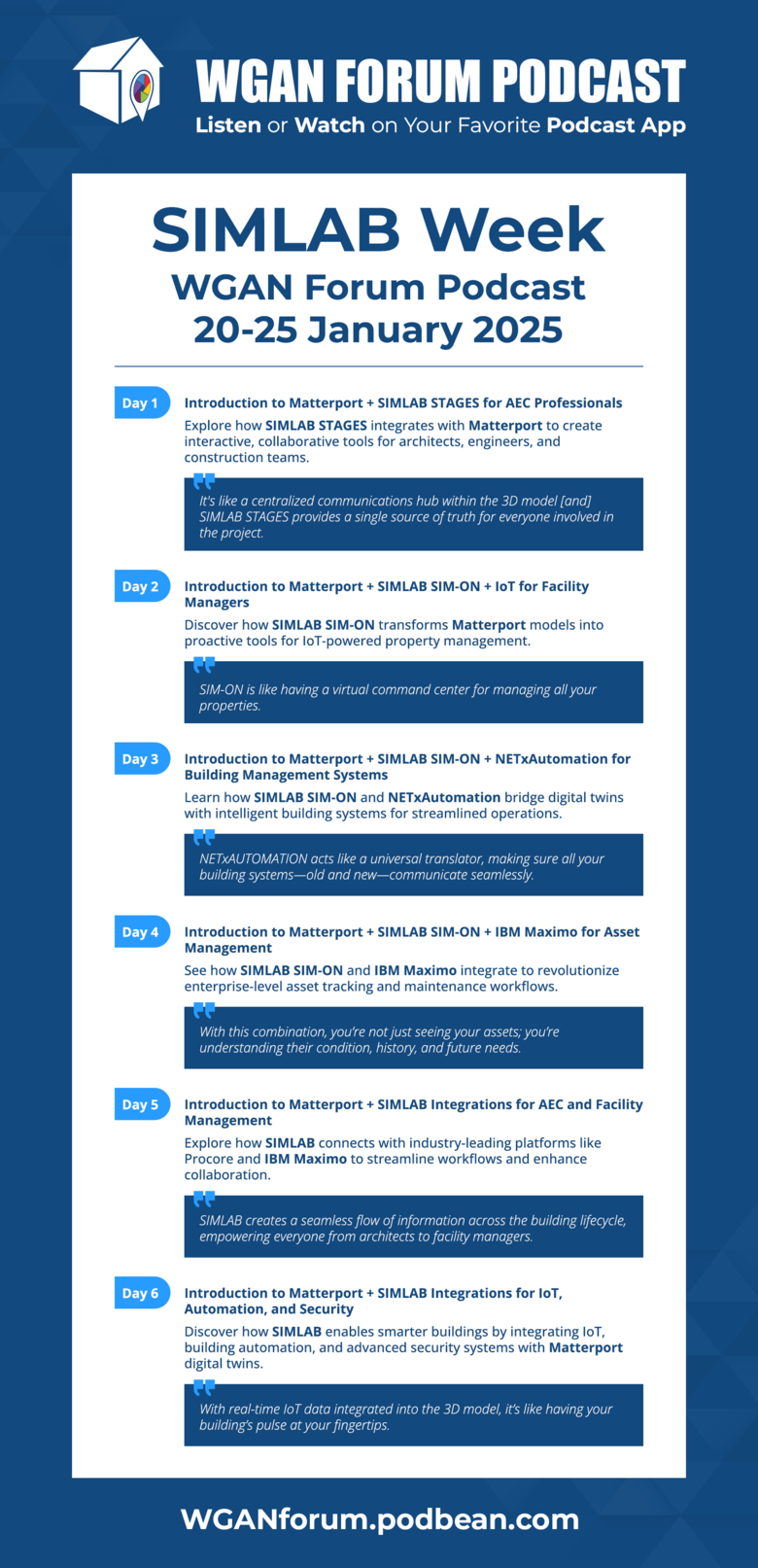Day 2: SIMLAB SIM-ON + Matterport Integration for Facilities Management20645
Pages:
1
 WGAN Forum WGAN ForumFounder and Advisor Atlanta, Georgia |
DanSmigrod private msg quote post Address this user | |
| SIMLAB is a WGAN Marketing Partner ---  WGAN Forum Podcast  WGAN Forum Podcast SIMLAB Week on WGAN Forum Podcast | Day 2: SIMLAB SIM-ON + Matterport Integration for Facilities Management | Tuesday, 21 January 2025 WGAN Forum Podcast | SIMLAB Week on WGAN Forum Podcast | Day 2: SIMLAB SIM-ON + Matterport Integration for Facilities Management | Tuesday, 21 January 2025 | @Jedrzej @SimlabSales @SIMLAB SIMLAB WEEK on WGAN Forum Podcast Day 2: SIMLAB SIM-ON + Matterport Integration for Facilities Management Hi All, Day 2 of SIMLAB WEEK on the WGAN Forum Podcast (Tuesday, 21 January 2025) dives into the power of SIMLAB SIM-ON for facilities management. Learn how combining Matterport 3D digital twin models with SIM-ON creates a central hub for managing properties, transforming workflows and delivering cost savings. Highlights: ✓ Streamlining maintenance with ticket task management. ✓ Proactive upkeep using an interactive timeline for preventive maintenance. ✓ Dynamic asset management for documentation, warranties, and more. ✓ AI-powered asset recognition and tagging for faster, smarter operations. ✓ Integration with building automation systems and IoT devices. This episode unpacks how SIMLAB SIM-ON enhances Matterport digital twins, creating a seamless experience for facility managers, tenants, and technicians alike. SIMLAB Links SIMLAB SIMLAB STAGES SIMLAB SIM-ON Transcript - [Host 1] All right, so day two of SIMLAB Week. Yesterday, kind of a broad overview, but today, let's zero in on something specific. I think this will be really useful for a lot of our listeners, especially if you're dealing with multifamily properties. - [Host 2] Mm-hmm. - [Host 1] It's how facility managers can use SIMLAB's SIM-ON platform with their Matterport models. - [Host 2] Yeah, it's really about, you've got these great digital twins, right? But SIM-ON makes them work harder for you, integrates with Matterport, turns those 3D models into like this central hub for managing your property. - [Host 1] Right, I was thinking about that the other day, like sometimes you get a Matterport model and it's so cool, all the details like a dollhouse, but then I'm like, "Okay, cool, but what can I do with this thing?" - [Host 2] And that's where SIM-ON comes in. You've got these digital replicas of your properties, why not use them to, you know, streamline things and make everyone's lives easier, save some money in the process? - [Host 1] For sure. Okay, so let's talk features. One that jumped out at me is their ticket task manager. Maybe seems simple on the surface, but I think it has huge implications for anyone handling maintenance request. - [Host 2] Oh, absolutely, think about it. Instead of emails flying around, phone calls you can't keep track of, spreadsheets, a tenant says, "Hey, the thermostat in my unit is acting up," that request goes right into SIM-ON, becomes a ticket, and it's linked to that exact thermostat, right there in the Matterport model. - [Host 1] So you're not just getting a message, you're seeing where the problem is, like spatially within the building. - [Host 2] Exactly, and then you can assign that ticket to a technician. They show up with the 3D model, all the ticket info, the right tools, no more wasted trips trying to figure out what's what. - [Host 1] Love that. Speaking of saving time and money, let's get into one of SIM-ON's top three features. The interactive timeline, it's like a calendar, but for all your maintenance tasks, right? - [Host 2] Right, think of it as your proactive maintenance command center. You know, you can schedule anything, recurring tasks for your assets like HVAC system checks, fire sprinkler inspections, even just like replacing air filters, and it's all visual, so you can clearly see what needs to happen and when. - [Host 1] If you manage a big, multi-family property, that sounds like a lifesaver. No more scrambling to fix stuff when it breaks. - [Host 2] Mm, and that's where the cost savings kick in, right? Stay on top of preventive maintenance, less downtime, your equipment lasts longer, avoid those huge emergency repair bills. - [Host 1] Okay, so the interactive timeline keeps us organized and proactive. What about dynamic asset management, another key feature? Seems like it'd be super-helpful for like keeping track of equipment documentation, all that jazz. - [Host 2] Picture this, you click on a water heater in your 3D model, boom, you've got manuals, warranty info, service history, even links to spare parts catalogs, like a virtual encyclopedia for every asset all right there. - [Host 1] No more digging through file cabinet for that one specific manual. I've been there. - [Host 2] And it's not just about convenience, right? Centralizing all that info means everyone on your team can find what they need when they need it, faster repairs, fewer headaches all around. - [Host 1] Okay, we've got the interactive timeline, we've got dynamic asset management. What's the third feature in SIM-ON's like awesome trifecta? - [Host 2] Communication, real-time communication, to be exact. It's all about how you connect with tenants, maintenance, anyone involved in running your properties. - [Host 1] I'm guessing this is more than just like email or texting. - [Host 2] Way more, built in chat, sharing photos and videos, right in the Matterport model, notifications that keep everyone updated. It's all about transparency and efficiency. - [Host 1] So say a tenant messages you with a picture of a leaky faucet, you assign the task to a plumber all within the platform, and everyone can track the repair in real-time. - [Host 2] That's it, no more confusion, no delays, problems get solved faster, tenants are happier. It's a win-win. You know, and something else to think about, you know, for people managing tons of properties or you know, big developments, SIM-ON doesn't just, you know, make things easier, it can really save you money. - [Host 1] Okay, yeah, we touched on that a little with preventative maintenance heading off those big repairs down the road, but like, what other ways does it help the budget? - [Host 2] Well, think about all the little inefficiencies that add up, you know, multiple trips to a site, because a technician doesn't have all the info. Time wasted hunting down documents, miscommunication causing delays, it all costs money. - [Host 1] Death by 1,000 paper cuts. - [Host 2] Yeah, exactly, and SIM-ON like takes care of those cuts right away, streamlined communication, all your info in one place, a visual overview of everything. It just makes things run smoother, and that means a healthier bottom line. - [Host 1] So it's not just about the cool tech features, it's about the actual impact on your costs. - [Host 2] Precisely, that's what makes SIM-ON so powerful. It's not a toy, it's a tool that can really boost your financial performance. - [Host 1] All right, let's talk about the AI-powered stuff in SIM-ON. Now, this is where things get kind of futuristic. - [Host 2] It's where science fiction meets reality, right? One of the coolest things SIM-ON can do is automatically recognize and tag assets in your Matterport models. - [Host 1] So like instead of manually clicking on every single light fixture, thermostat, appliance to create a MatterTag, SIM-ON's AI does it for you. - [Host 2] Exactly. SIMLAB trained their AI on a massive amount of Matterport data so it can identify things based on their shape, size, location in the 3D environment. - [Host 1] It's almost like teaching the AI to see like we do. - [Host 2] That's a great way to put it, and like us, the AI keeps learning and getting better. The more data it gets, the more accurate it becomes. - [Host 1] Mm-hmm, that's incredible. But got to ask the skeptical question. How accurate is it really? Can it tell the difference between say a fridge and a washing machine just from the 3D data? - [Host 2] Good question, and the accuracy is constantly improving. It may not be perfect 100% of the time, but it can drastically reduce the amount of manual tagging you have to do. Think about a huge apartment complex with hundreds of units. Tagging every appliance and every unit manually would be a nightmare. - [Host 1] Not to mention incredibly boring. - [Host 2] Exactly. The AI can do most of that work for you, freeing up facility managers to focus on, you know, more important things. - [Host 1] But what if the AI messes up, like tags a dishwasher as a washing machine, is there a way to fix that? - [Host 2] Of course, AI is a tool, not a replacement for human intelligence. SIM-ON was designed with collaboration in mind. Facility managers can easily review and edit the AI-generated tags, making sure everything is accurate and consistent. - [Host 1] So it's like a partnership, human intelligence working with artificial intelligence. - [Host 2] I like that the AI does the grunt work and humans provide the oversight to make sure it's all good. - [Host 1] So we've talked about AI asset recognition and tagging. What other AI stuff is coming down the pipeline for SIM-ON? - [Host 2] Ooh, this is where things get really interesting. SIMLAB is looking into how AI can predict equipment failures based on past data and usage patterns. Imagine getting a notification that an HVAC unit is showing signs of wear and tear and might need maintenance soon. - [Host 1] That would be amazing. Instead of waiting for something to break, you could fix it before it becomes a problem. - [Host 2] Exactly, shifting from reactive maintenance to proactive maintenance, and AI is the key to doing that. - [Host 1] It sounds almost too good to be true, but AI is still pretty new. What would you say to people who are hesitant or skeptical about using it for facility management? - [Host 2] I'd say don't be afraid to explore the possibilities. AI isn't about replacing us, it's about helping us work smarter. - [Host 1] Yeah. - [Host 2] SIMLAB is developing SIM-ON with a human-centric approach, making sure that technology enhances our capabilities, not replaces them. - [Host 1] That's important to remember we're not talking about robots taking over our jobs. It's about using tech to make our jobs better. - [Host 2] And SIM-ON is a great example of that. It takes care of the boring, repetitive stuff so we can focus on the things that require human skills, you know, creativity, problem solving. - [Host 1] Like having a super-powered assistant who handles the grunt work, while you focus on the big picture. - [Host 2] Exactly, and as AI keeps getting better, we can expect even more innovative applications that will transform facility management. - [Host 1] Speaking of transformation, let's talk about another key aspect of SIM-ON, its ability to integrate with building automation systems and all those IoT devices. That's where you really get a connected building ecosystem. - [Host 2] For sure, SIM-ON is like a central hub, bringing together data from all your different systems and showing it to you in a clear, visual way, right within the Matterport model. - [Host 1] So instead of having to check like a million different platforms and dashboards to monitor your building, you can see it all in one place. - [Host 2] Exactly, you click on a thermostat in your model and you see its current temperature, energy usage, even maintenance logs. - [Host 1] That's got to be so useful for troubleshooting, finding patterns, and just making smarter decisions about how the building operates. - [Host 2] And it's not just thermostats. You can connect it to lighting, security cameras, access control, all kinds of stuff. - [Host 1] So it's a truly holistic platform for managing every aspect of a building, all within that digital twin. - [Host 2] Exactly, and that's what makes SIM-ON so powerful. It gives you a unified view of the building. No more information silos, just better decision making. - [Host 1] Okay, I know some of our listeners are thinking this is great, but how hard is it to actually set this up and integrate SIM-ON with my current systems? Is it something you can do yourself, or do you need a whole team of engineers? - [Host 2] SIMLAB has made the integration process pretty straightforward. They've got great documentation, video tutorials, and really responsive customer support to help you every step of the way. - [Host 1] So not exactly plug and play, but manageable for anyone who's comfortable with tech. - [Host 2] Right, and if you need a little extra help, SIMLAB offers professional services to help with the setup, customization, and integration. - [Host 1] That's good to know. It's great that they have options for people who want a more hands-on approach. - [Host 2] Mm-hmm. - [Host 1] Okay, shifting gears a bit, let's talk about communication and collaboration, essential for any facility manager. How does SIM-ON improve these crucial aspects of the job? - [Host 2] SIM-ON is amazing at creating a central platform for communication between facility managers, tenants, and maintenance teams. - [Host 1] We talked about the ticket task manager, which helps with maintenance requests, but what else is there? - [Host 2] Well, SIM-ON also has a real-time chat feature so you can talk directly to tenants, technicians, or anyone on your team right in the platform. No more endless email chains or trying to catch someone on the phone. - [Host 1] That sounds like a dream come true, so much easier. - [Host 2] And it's not just text. You can attach photos, videos, documents to your messages, really helpful for giving visual context and extra information. - [Host 1] So say a tenant reports a leak, they can send a message through SIM-ON with a picture of it and the facility manager can immediately assign a technician to fix it. - [Host 2] Exactly, and the technician can use the 3D model and ticket info to easily find the leak, see any relevant maintenance records, even message the tenant to schedule a good time for repairs. - [Host 1] It really streamlines the whole communication process. - [Host 2] That's the beauty of SIM-ON. It brings everything together, making things more efficient, transparent, and collaborative for everyone. - [Host 1] Like having a virtual command center for managing all your properties. But let's be real, a system like this sounds expensive. Is SIM-ON only for big companies with tons of money? - [Host 2] Not at all. SIMLAB has a bunch of different subscription plans to fit different needs and budgets. Their free plan is great for individuals or small businesses to try it out and see how it works. - [Host 1] And their paid plans give you more features and flexibility if you have more properties or need more advanced capability. - [Host 2] Exactly, SIMLABs pricing is very clear and they don't lock you into long contracts, so you can choose the plan that works best for you and change it if you need to. - [Host 1] That's great. It makes SIM-ON accessible to everyone from individual property owners to large management companies. - [Host 2] For sure, SIMLAB wants everyone to be able to use this technology no matter their budget or technical skills. - [Host 1] Before we wrap up this part, I want to touch on security and data privacy. We're talking about sensitive building data and personal info, so it's got to be handled carefully. - [Host 2] You're right, data security is super important for any tech platform, especially one that deals with things like building plans, tenant details, maintenance records. - [Host 1] So how does SIM-ON protect all that data from unauthorized access or breaches? - [Host 2] SIMLAB takes data security very seriously. They use the best encryption to protect data, both when it's being sent and when it's stored. They also follow all the relevant data privacy regulations, including GDPR, which is the toughest standard out there. - [Host 1] Good to hear. Choosing a platform that prioritizes data security is essential. - [Host 2] Absolutely, and SIMLAB has a great track record. They know how important it's to build trust with their users, and data security is a big part of that. - [Host 1] Okay, I think we've covered a lot in this part. We talked about AI and facility management; SIM-ON's integration capabilities; communication and collaboration features; the flexible pricing; and their commitment to data security. - [Host 2] We really highlighted how important it is for a platform like this to protect sensitive information. - [Host 1] I'm really impressed with SIM-ON. It's a really innovative platform that could change the way facility managers and property professionals work. - [Host 2] I agree. SIMLAB is really pushing the boundaries, and I'm excited to see how SIM-ON continues to evolve and shape the future of buildings. - [Host 1] Now, in the last part of our deep dive, we'll discuss some of the challenges and limitations of SIM-ON, and talk about what AI and digital twin technology mean for the future of facility management. Stick with us. Okay, so we've talked a lot about the cool stuff SIM-ON can do, especially for folks in multi-family properties, but like with anything, got to be realistic, right? It's not all perfect, ugh. So what are some of the, I guess, challenges or maybe limitations someone might run into with SIM-ON? - [Host 2] Yeah, good point, no tech is a magic solution, and with SIM-ON, one thing to think about is the initial setup, getting it integrated with your systems. SIMLAB's made it pretty user-friendly, but connecting it to all your building systems and IoT sensors, that does take some technical know-how. - [Host 1] Yeah, I could see that being a hurdle for say, a smaller company that maybe doesn't have a dedicated IT person. - [Host 2] Definitely, and for those folks, SIMLAB does offer professional services to help with that whole setup and integration piece. But yeah, it's something to consider. - [Host 1] And even once it's set up, there's the whole data thing, right? Making sure it's accurate and consistent. SIM-ON's pulling data from all over, so if that data's messed up, it's not going to work as well. - [Host 2] Exactly, garbage in, garbage out, right? - [Host 1] Yeah. - [Host 2] So data hygiene is important. Facility managers need to make sure their building systems are giving good data to SIM-ON, otherwise you're not getting the full benefits. - [Host 1] What about the AI? We've talked about how cool it is, but are there any limitations there that people should know about? - [Host 2] Well, AI is powerful, but it's still learning and growing. Like with the asset recognition, how accurate it is depends on what data it was trained on. So let's say it was mostly trained on models of new buildings, it might not be as good at analyzing an older building with, you know, unique features. - [Host 1] So you got to be aware of that and understand that the AI might need some tweaking or a human double-checking things, at least at first. - [Host 2] Yeah, it's all about balance, AI doing the automation, but humans making sure it's accurate and making those judgment calls where you need experience. - [Host 1] Okay, bigger picture now, how do you see AI and digital twin tech like SIM-ON changing the future of facility management overall? - [Host 2] I think we're at this turning point. These technologies, they can completely revolutionize how buildings are designed, built, operated, maintained. Imagine buildings that are actually intelligent, collecting data, predicting problems before they happen, making themselves better all the time. - [Host 1] It sounds kind of sci-fi, but it also makes you think about what happens to the human jobs, right? - [Host 2] Yeah. - [Host 1] Like are robots going to replace facility managers someday? - [Host 2] Lots of industries are asking that question, and yeah, AI will automate stuff, but I truly believe that the human element is irreplaceable. Facility managers, they bring this mix of technical skills, problem solving, and that human touch that you need when you're working with tenants, with people. - [Host 1] So it's not AI versus humans, it's AI and humans both working together, using their best qualities to make the built environment better. - [Host 2] Exactly. AI can crunch the numbers, make predictions, automate the routine tasks, but we'll always need humans for the strategic thinking, the complex problem-solving, and the situations where you need empathy, creativity, that critical thinking. - [Host 1] It's a good thought, and it really shows how important it is for facility managers to be adaptable, to keep learning new things. - [Host 2] Absolutely. Being open to new tech, building those human skills, being curious about how facility management is changing, that's how you stay ahead of the game. - [Host 1] Well said. This has been a super-interesting deep dive into SIMLAB SIM-ON. It really feels like it could be a total game-changer for facility managers, especially those working with multi-family properties. - [Host 2] I agree, and to all our listeners out there, I'd say go check out SIM-ON, see how it could work for you. If you're ready to jump in, head to www.SIMLABinc.com and click contact us to get started. - [Host 1] And if you want to learn even more about the tech and what it can do, be sure to watch those WGAN-TV Podcast shows featuring SIMLAB. You can find them at: WGAN.info/SIMLABonWGAN That's: wgan.info/SIMLABonWGAN - [Host 2] The future of facility management is happening now, and it's exciting. - [Host 1] That's it for our deep dive today. Thanks for joining us.  WGAN Forum Podcast SIMLAB Links 1. SIMLAB 2. SIMLAB STAGES 3. SIMLAB SIM-ON |
||
| Post 1 • IP flag post | ||
Pages:
1This topic is archived. Start new topic?

















